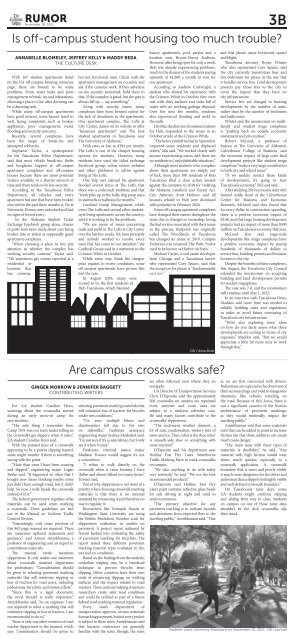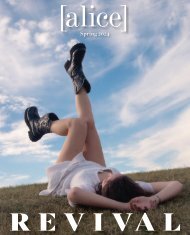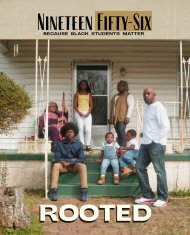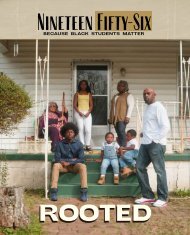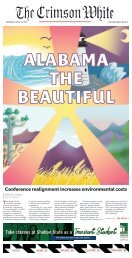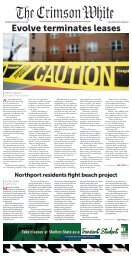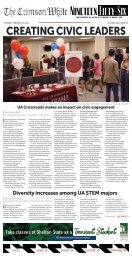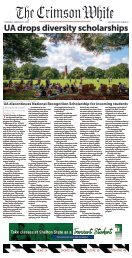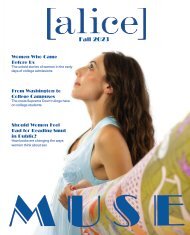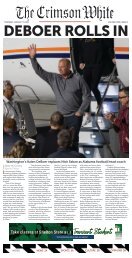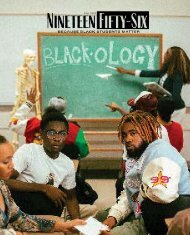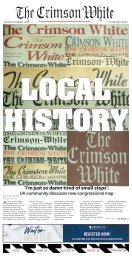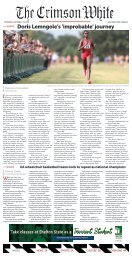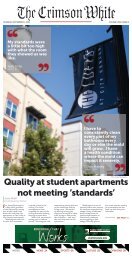The Crimson White: Rumor Edition, November 2021
Rumors spread quickly on campus and tend to linger. In this edition, The Crimson White confirms or debunks some of the most notorious rumors that surround our campus.
Rumors spread quickly on campus and tend to linger. In this edition, The Crimson White confirms or debunks some of the most notorious rumors that surround our campus.
You also want an ePaper? Increase the reach of your titles
YUMPU automatically turns print PDFs into web optimized ePapers that Google loves.
RUMOR<br />
<strong>November</strong> 18, <strong>2021</strong><br />
Is off-campus student housing too much trouble?<br />
3B<br />
ANNABELLE BLOMELEY, JEFFREY KELLY & MADDY REDA<br />
THE CULTURE DESK<br />
With 167 student apartments listed<br />
on the UA off-campus housing resources<br />
page, there are bound to be some<br />
problems. From water leaks and poor<br />
management to break-ins and infestations,<br />
choosing a place to live after dorming can<br />
be a daunting task.<br />
While many off-campus apartments<br />
have good reviews, some haven’t fared so<br />
well, facing complaints such as broken<br />
appliances, poor management, mold,<br />
flooding and security concerns.<br />
Recently, several complexes have<br />
been the target of break-ins and<br />
attempted robberies.<br />
Stephanie Taylor, a spokesperson<br />
for the Tuscaloosa Police Department,<br />
said that most vehicle break-ins, thefts<br />
and burglaries happen at off-campus<br />
apartment complexes and off-campus<br />
houses because there are more potential<br />
victims available in a shorter amount of<br />
time and there tends to be less security.<br />
According to the Tuscaloosa Police<br />
Department, all vehicles and every<br />
apartment but one that have been broken<br />
into within the past three months at Vie at<br />
University Downs were unlocked and had<br />
no signs of forced entry.<br />
In the Alabama Student Ticket<br />
Exchange Facebook group alone, dozens<br />
of posts have been made about cars being<br />
broken into or stolen at supposedly gated<br />
apartment complexes.<br />
“When choosing a place to live, pay<br />
attention to whether the complex has<br />
working security cameras,” Taylor said.<br />
“We sometimes get crimes reported at a<br />
residential or<br />
business that<br />
has cameras,<br />
but not functional ones. Check with the<br />
apartment management on occasion and<br />
ask if the cameras work. If they advertise<br />
on-site security personnel, hold them to<br />
that. If the complex is gated, but the gate is<br />
always left up — say something.”<br />
Along with security issues, many<br />
complexes have been berated online for<br />
the lack of cleanliness in the apartments.<br />
One apartment complex, <strong>The</strong> Lofts at<br />
City Center, claims on its website to offer<br />
“luxurious apartments” and “the best<br />
student apartments in Tuscaloosa near<br />
<strong>The</strong> University of Alabama.”<br />
With rates as low as $394 per month,<br />
<strong>The</strong> Lofts is one of the cheaper housing<br />
options for students. However, many<br />
residents have used the ticket exchange<br />
Facebook group, online review websites<br />
and other platforms to advise against<br />
living at <strong>The</strong> Lofts.<br />
One Yelp user claimed his apartment<br />
flooded several times at <strong>The</strong> Lofts, that<br />
there was a cockroach problem, and that<br />
“trash piles up in the halls, dog poop stays<br />
in stairwells or hallways for months.”<br />
Cardinal Group Management, which<br />
owns <strong>The</strong> Lofts and several other studentstyle<br />
living apartments across the country,<br />
said it is working to fix the problems.<br />
“We are aware of issues concerning<br />
trash and mold in <strong>The</strong> Lofts at City Center<br />
over the last few weeks. We have promptly<br />
and actively worked to resolve every<br />
issue that has come to our attention.” the<br />
Cardinal Group said in a statement to the<br />
<strong>Crimson</strong> <strong>White</strong> in October.<br />
While some may think the cheaper<br />
price equates to worse conditions, some<br />
off-campus apartments have proven this<br />
isn’t the case.<br />
In August 2018, many were<br />
excited to be the first residents of<br />
Hub Tuscaloosa, which flaunted<br />
luxury apartments, pool parties and a<br />
location near Bryant-Denny Stadium.<br />
However, after being open for only a week,<br />
Hub was already experiencing problems,<br />
much to the dismay of the students paying<br />
upwards of $1,200 a month in rent for<br />
one apartment.<br />
According to Andrew Cartwright, a<br />
student who shared his experience with<br />
the <strong>Crimson</strong> <strong>White</strong> in October, they were<br />
met with dirty surfaces and sinks full of<br />
water with no working garbage disposal.<br />
Over the next few months, residents<br />
also experienced flooding and mold in<br />
the walls.<br />
Lily Mai, the director of communications<br />
for Hub, responded to the issues in an<br />
October article of the <strong>Crimson</strong> <strong>White</strong>.<br />
“<strong>The</strong> heavy rainfall we had in September<br />
impacted some residents and displaced<br />
others,” Mai said. “We worked closely with<br />
anyone experiencing issues, and there are<br />
no residents in [un]inhabitable situations.”<br />
Although most students who complain<br />
about their apartments are simply out<br />
of luck, more than 100 residents of Hub<br />
Tuscaloosa filed a class action lawsuit<br />
against the company in 2018 for violating<br />
the Alabama Landlord and Tenant Act.<br />
City Attorney Scott Holmes said all<br />
lawsuits related to Hub were dismissed<br />
with prejudice in February 2020.<br />
Some off-campus apartment complexes<br />
have changed their names throughout the<br />
years due to changes in ownership, losing<br />
the bad reviews associated with their name<br />
in the process. Redpoint was originally<br />
called <strong>The</strong> Woodlands of Tuscaloosa<br />
but changed its name in 2019. Campus<br />
Evolution was renamed <strong>The</strong> Path. Evolve<br />
used to be known as Harbor on Sixth.<br />
Michael Cartee, a real estate developer<br />
from Chicago and a Tuscaloosa lawyer<br />
who represented Core Spaces, said that<br />
the exception for plexes is “fundamentally<br />
unfair”<br />
CW / Anna Butts<br />
and that plexes cause horizontal sprawl<br />
and blight.<br />
Tuscaloosa attorney Bryan Winter,<br />
who also represented Core Spaces, said<br />
the city currently incentivizes four and<br />
five bedrooms for plexes in the way that<br />
it handles service fees. Land development<br />
projects pay those fees to the city to<br />
cover the impact that they have on<br />
city infrastructure.<br />
Service fees are charged to housing<br />
developments by the number of units,<br />
rather than by the number of bedrooms<br />
and bathrooms.<br />
Winter said the moratorium on multifamily<br />
and student mega complexes<br />
is “pushing back on outside economic<br />
investment and job creation.”<br />
Robert McLeod, a professor of<br />
finance at <strong>The</strong> University of Alabama’s<br />
Culverhouse College of Business, said<br />
the economic impact of large-scale land<br />
development projects like student mega<br />
complexes “make a very large contribution<br />
to both city and school taxes.”<br />
“If we unduly restrict these kinds<br />
of developments, it’s going to hurt<br />
Tuscaloosa’s economy,” McLeod said.<br />
After studying 2019 economic data with<br />
Samuel Addy, head of the Culverhouse<br />
Center for Business and Economic<br />
Research, McLeod said they found that<br />
for every dollar in construction spending,<br />
there is a positive economic impact of<br />
$2.40, and that large housing development<br />
projects had an impact of more than $500<br />
million on Tuscaloosa’s economy that year.<br />
McLeod also said large-scale<br />
developments like mega complexes have<br />
a positive economic impact by paying<br />
hundreds of thousands of dollars in<br />
service fees, building permits and business<br />
licenses to the city.<br />
Despite the benefits of these complexes,<br />
this August, the Tuscaloosa City Council<br />
extended the moratorium on accepting<br />
building and land development permits<br />
for student megaplexes.<br />
<strong>The</strong> vote was 7-0, and the moratorium<br />
will continue until May 1, 2022.<br />
In an interview with Tuscaloosa News,<br />
Maddox said more time was needed to<br />
solidify building rules and regulations<br />
in order to avoid future overtaxing of<br />
Tuscaloosa city infrastructure.<br />
“We’re also exploring some ideas<br />
on how do you fairly assess what these<br />
developments are costing in terms of city<br />
expenses,” Maddox said. “But we would<br />
appreciate a little bit more time to work<br />
through this.”<br />
For UA student Caroline Horn,<br />
warnings about the crosswalks started<br />
during an early move-in camp for<br />
new students.<br />
“<strong>The</strong> only thing I remember from<br />
Camp 1831 was our team leader telling us<br />
the crosswalks get slippery when it rains,”<br />
UA student Caroline Horn said.<br />
With the painted lines of a crosswalk<br />
appearing to be a potent slipping hazard,<br />
some might wonder if there is something<br />
wrong with the paint.<br />
“More than once I have been crossing<br />
and slipped,” engineering major Logan<br />
Burke said. “It happened so often that I<br />
bought new shoes thinking maybe mine<br />
just didn’t have enough tread, but it didn’t<br />
help. So now I walk beside the crosswalk<br />
instead of in it.”<br />
<strong>The</strong> federal government regulates what<br />
materials can be used when marking<br />
a crosswalk. <strong>The</strong>se guidelines are laid<br />
out in the Manual on Uniform Traffic<br />
Control Devices.<br />
“Interestingly, only some portions of<br />
this 862-page manual are required. <strong>The</strong>re<br />
are numerous optional statements and<br />
guidance,” said Armen Amirkhanian, a<br />
professor of engineering and an expert in<br />
cementitious materials.<br />
<strong>The</strong> manual rarely mentions<br />
slipperiness. It only makes one statement<br />
about crosswalk material slipperiness<br />
for pedestrians: “Consideration should<br />
be given to selecting pavement marking<br />
materials that will minimize tripping or<br />
loss of traction for road users, including<br />
pedestrians, bicyclists, and motorcyclists.”<br />
“Since this is a legal document,<br />
the word ‘should’ is really important,”<br />
Amirkhanian said. “As an engineer, I am<br />
not required to select a marking that will<br />
minimize tripping or loss of traction. I am<br />
recommended to do so.”<br />
<strong>The</strong>re is only one other mention of road<br />
marker slipperiness in the manual, which<br />
says “consideration should be given to<br />
Are campus crosswalks safe?<br />
GINGER MORROW & JENNIFER BAGGETT<br />
CONTRIBUTING WRITERS<br />
selecting pavement marking materials that<br />
will minimize loss of traction for bicycles<br />
under wet conditions.”<br />
“I’ve seen multiple bikers and<br />
skateboarders fall due to the rain<br />
on sidewalks,” freshman aerospace<br />
engineering major Sydney Moskalick said.<br />
“I’m not sure if it’s a coincidence, but I only<br />
see it when it rains.”<br />
Freshman criminal justice major<br />
Madison Towner would suggest it’s not<br />
a coincidence.<br />
“I refuse to walk directly on the<br />
crosswalk when it rains because I have<br />
[fallen and almost fallen] too many times,”<br />
Towner said.<br />
Part of why slipperiness is not more of a<br />
priority when choosing crosswalk marking<br />
materials is that there is no national<br />
standard for measuring it and therefore no<br />
way to regulate it.<br />
Researchers like Somayeh Nassiri at<br />
Washington State University are using<br />
the British Pendulum Number scale for<br />
slipperiness evaluation in studies on<br />
pavement. A project report authored by<br />
Nassiri looked into evaluating the safety<br />
of pavement marking for bicyclists. <strong>The</strong><br />
report tested three different pavement<br />
marking material types evaluated in dry,<br />
wet and icy conditions.<br />
Based on the findings from the analysis,<br />
centerline striping may be a beneficial<br />
technique to prevent bicycles from<br />
slipping. Other countries have their own<br />
units of measuring slippage on walking<br />
surfaces and the impact related to road<br />
markers. Those units are helping American<br />
researchers create safer road conditions<br />
and could be utilized as part of a future<br />
federal road marking material regulation.<br />
Every state’s department of<br />
transportation approves certain materials<br />
for marking pavement, but not every project<br />
is subject to these rules. Amirkhanian said<br />
that because contractors are generally<br />
familiar with the rules, though, the rules<br />
are often followed even where they do<br />
not apply.<br />
UA Director of Transportation Services<br />
Chris D’Esposito said the approximately<br />
500 crosswalks on campus are repainted<br />
every summer and worn ones are<br />
subject to a midyear refresher coat.<br />
He said many factors contribute to the<br />
crosswalks’ slipperiness.<br />
“<strong>The</strong> inclement weather element, a<br />
lot of rain, condensation, wintery mix of<br />
snow and ice. <strong>The</strong>n, what is the shoe style?<br />
A smooth-sole shoe or something with<br />
more traction?”<br />
D’Esposito said his department uses<br />
Hotline Fast Dry Latex Waterborne<br />
Traffic Marking Paint to mark crosswalks<br />
on campus.<br />
“We take anything to do with safety<br />
very seriously,” he said. “We use the best<br />
recommended products.”<br />
D’Esposito said Hotline Fast Dry<br />
Latex paint contains reflective glass beads<br />
for safe driving at night and sand to<br />
retain coarseness.<br />
“<strong>The</strong> primary objective for any<br />
pavement marking is to indicate hazards<br />
and deviations from expected flow to the<br />
traveling public,” Amirkhanian said. “That<br />
is, we are first concerned with drivers.<br />
Pedestrians are expected to be observant of<br />
their surroundings and yield to dangerous<br />
situations, like vehicles traveling on<br />
the road. Because of this focus, there is<br />
not a significant concern of the friction<br />
performance of pavement markings,<br />
as they would minimally impact the<br />
traveling public.”<br />
Amirkhanian said that some materials<br />
exist that can be added to paint to increase<br />
friction but that those additives can create<br />
much more danger.<br />
“<strong>The</strong> main issue with these types of<br />
materials is durability,” he said. “Any<br />
material with high friction would wear<br />
down much quicker, especially in a<br />
crosswalk application. A crosswalk<br />
boundary that is worn and poorly visible<br />
is much more dangerous for the driver and<br />
pedestrian than a slippery but highly visible<br />
and well-defined crosswalk boundary.”<br />
On Tuscaloosa’s rainy days, some<br />
UA students might continue slipping<br />
and sliding their way to class. Students<br />
on campus on one of those rainy days<br />
shouldn’t let the slick crosswalks slip<br />
their mind.<br />
Students cross University Boulevard on <strong>November</strong> 10, <strong>2021</strong>. CW / Lexi Hall


